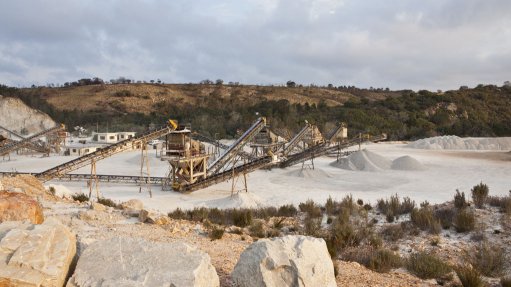
CHALLENGING CONDITIONS Overall, the construction materials sector remains relatively flat
With the general depletion of natural sand reserves around South Africa, especially within large cities, multidisciplinary openpit mining company Afrimat has invested in sand producing plants – especially in Gauteng – to produce high-quality concrete sands to ensure higher concrete quality for end-users.
“The current market in the construction materials sector continues to be challenging. We are seeing a relatively buoyant market in the Western Cape but, unfortunately, the Gauteng market is showing the contrary. So, overall, the construction materials sector remains relatively flat,” says Afrimat group marketing manager Hylton Hale.
Owing to this “flat” demand in the construction materials sector and in line with Afrimat’s diversification strategy, Afrimat, in 2016, acquired lime and associated products producer Cape Lime Group to extend its product offering in the industrial minerals sector.
This acquisition, Hale notes, extends Afrimat’s footprint into the construction materials market, in addition to burnt lime and industrial minerals.
The company has an operation in Vredendal, which supplies dolomite and limestone, and Langvlei, which only produces dolomite, both in the Western Cape.
High-grade limestone, which is low in iron content, is quarried and processed as feed for fluid-bed lime calciners used in mineral processing and as raw materials for the glass industry, while lower-grade dolomite is quarried and processed as aggregate for the local building and road construction industries stretching south to as far as Citrusdal.
“A limited amount of dolomitic agricultural lime is produced during dolomite crushing, with the material being sold into the citrus producing areas surrounding Clanwilliam and Citrusdal.”
Limestone in the 1-mm- to –6-mm-size fraction range, Hale explains, is fed into the fluid-bed calciner, where calcitic quicklime is produced. Quicklime is sold to heavy minerals miner Namakwa Sands, based in Vredenburg, South Africa, as a neutralising reagent, and as a pH control reagent in the zinc flotation process to zinc miner Skorpion Zinc, located in Rosh Pinah, in Namibia.
The bulk of the quicklime is ‘hydrated’ to produce hydrated lime, with various grades of hydrated lime being sold to the potable water treatment industry and to tanneries for chemical applications, wastewater treatment, soil stabilisation, pH control in mineral processing and specialist chemical production, such as chlorine.
“In addition, bag-filter by-products are used in products being sold for application in asphalt and flue-gas scrubbing applications.”
Burnt lime is hydrated, milled, classified and bagged as either Cape Lime Group’s CLC building and plaster lime or gluex/ikalika whitewash.
“The CLC lime is marketed as a partial replacement for cement in plaster and mortar mixes, and is distributed to hardware wholesalers and retailers.”
Whitewash lime, however, has a few traditional applications in historical buildings, farm dwellings, pigstys and stables, with its application in mine shafts leading to improved reflectivity of light and containment of rock dust.
At the Langvlei operation, Hale explains, dolomite is quarried, with the main focus being on the production of dolomite for kiln feed and the remainder of the material used as construction aggregates.
Completed and Currently under Way
While growing the local footprint of Afrimat, GM for engineering services Johan Bisshoff notes that the company has completed various projects to ensure security of supply for its customer base.
These projects include Afrimat’s New Ladysmith quarry, in Ladysmith, KwaZulu-Natal, which has a new crushing and screening plant producing a range of products destined for local construction and roadbuilding applications.
Afrimat is also completing in-progress crushing and screening plant upgrades at its Hluhluwe quarry, in Hluhluwe, KwaZulu-Natal, with its product range destined for local consumption in construction and roadbuilding applications.
Further crushing and screening plant upgrades were completed at Afrimat’s Bethlehem quarry, in Bethlehem, Free State.
Afrimat is also undertaking a primary crushing plant capacity upgrade at its Marblehall limestone mine, in Marblehall, Limpopo, as well as crushing and screening plant capacity upgrades at its Lyttelton dolomite mine, in Centurion, Gauteng.
Further projects in progress include a new subbase plant for Afrimat’s Kliprug quarry, in Durbanville, Western Cape, as well a dense-media-separation feed preparation plant and capacity upgrades for its Diro iron-ore mine in Kathu, in the Northern Cape.
The acquisition of the Kathu mine, Hale says, has potential to boost Afrimat’s headline earnings; however, it is still early days. Indications are that the company should be able to start supplying iron-ore to the market by the end of July.
Afrimat operates across most of South Africa, but also has quarries in northern Mozambique and supplies operations across Africa.